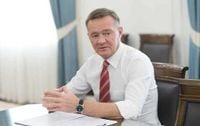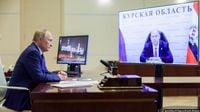The arrest of former Kursk governor Aleksey Smirnov has sent shockwaves through the political landscape of Russia, revealing deep-seated corruption linked to the construction of defensive structures on the Ukrainian border. Accused of embezzling over a billion rubles, Smirnov's case is not just about one man's alleged crimes but is seen as a potential domino that could topple higher-ranking officials within the Ministry of Transport and beyond.
Smirnov's arrest on April 16, 2025, came after months of scrutiny from security forces and media alike. He was charged with large-scale fraud related to the construction of fortifications, including the infamous "dragon's teeth," which reportedly failed to withstand even light weather conditions. These structures were supposed to provide critical defense against incursions by the Armed Forces of Ukraine, which occurred in August 2024. However, they proved ineffective, leading to questions about the quality of the work done and the allocation of federal funds.
According to reports, Smirnov, who served as governor for a mere six months, was not alone in facing charges. His deputy, Aleksey Dedov, was also arrested, and several managers from the "Corporation for the Development of the Kursk Region" were detained earlier in connection with the same case. The Kremlin has taken an active interest in the investigation, which has now escalated to a level of state importance.
Many analysts believe that Smirnov's arrest could be the tip of the iceberg, with potential repercussions for his predecessor, Roman Starovoit, the current Minister of Transport. Starovoit oversaw the construction of the fortifications during his time as governor and is now under scrutiny for his role in the alleged corrupt practices. High-ranking officials familiar with the inner workings of the government have suggested that Starovoit may have had significant control over the projects and the funds involved.
"The criminal case against Smirnov may be directly linked to the activities of Starovoit," said a source familiar with the investigation. "Smirnov supervised the construction, but the primary oversight likely came from Starovoit, who was in charge during that critical period." This connection raises serious questions about accountability at the highest levels of government.
As the investigation unfolds, insiders speculate that the Kremlin may be using Smirnov's case to make a broader statement about corruption within the ranks of regional leadership. Some have gone so far as to suggest that this could lead to a significant reshuffling of power within the Ministry of Transport, especially as the government seeks to regain public trust amid ongoing military operations and economic challenges.
In the wake of the arrests, there are concerns that the political fallout could extend beyond Smirnov and Starovoit. Other figures, including Vice-Premier Marat Khusnullin and Vice-Premier Vitaly Savelev, may find themselves embroiled in the investigation as well. Khusnullin, who has been a key player in the construction sector, is seen as vulnerable, while Savelev, a former Minister of Transport, could leverage the situation to bolster his own position.
Political analysts have noted that the current climate is fraught with uncertainty. "For Starovoit, there are no good options," remarked Vladimir Slatinov, a local political analyst. "If he claims ignorance of his team's actions, it casts doubt on his leadership. If he knew and did nothing, that raises even more serious concerns about his integrity. And if he participated in any wrongdoing... well, that’s a whole different conversation."
As the investigation continues, the focus remains on the distribution of resources for a massive road construction plan set to run until 2030, with a budget exceeding 9 trillion rubles. Many federal players are keen to influence this plan, and the fallout from Smirnov's arrest could reshape the landscape of the construction sector in Russia.
Starovoit, who has been a prominent figure in the region, is reportedly facing increasing pressure as the investigation unfolds. Some sources suggest that his resignation may be imminent, with insiders indicating that a document for his dismissal has already been signed by Prime Minister Mikhail Mishustin, awaiting public announcement.
In this high-stakes game of political chess, the outcome remains uncertain. The arrest of Smirnov has opened a Pandora's box of potential corruption that could implicate numerous officials and contractors involved in the construction projects. As the situation develops, many are watching closely to see how far the investigation will reach and whether it will lead to significant changes within the Russian government.
Meanwhile, the new head of the Kursk region, Alexander Khinshtein, has taken a proactive stance, even conducting a consecration ceremony for his office amidst the turmoil. He acknowledged the "sins accumulated in these walls," hinting at the deep-rooted issues plaguing the administration.
The ramifications of Smirnov's arrest are likely to resonate far beyond the borders of the Kursk region, as the Kremlin grapples with the implications of corruption and accountability in a time of crisis. With the war in Ukraine ongoing and public confidence wavering, the stakes have never been higher for Russian officials.
As the investigation unfolds, it remains to be seen whether justice will be served or if the political machinations will continue to overshadow the truth.







